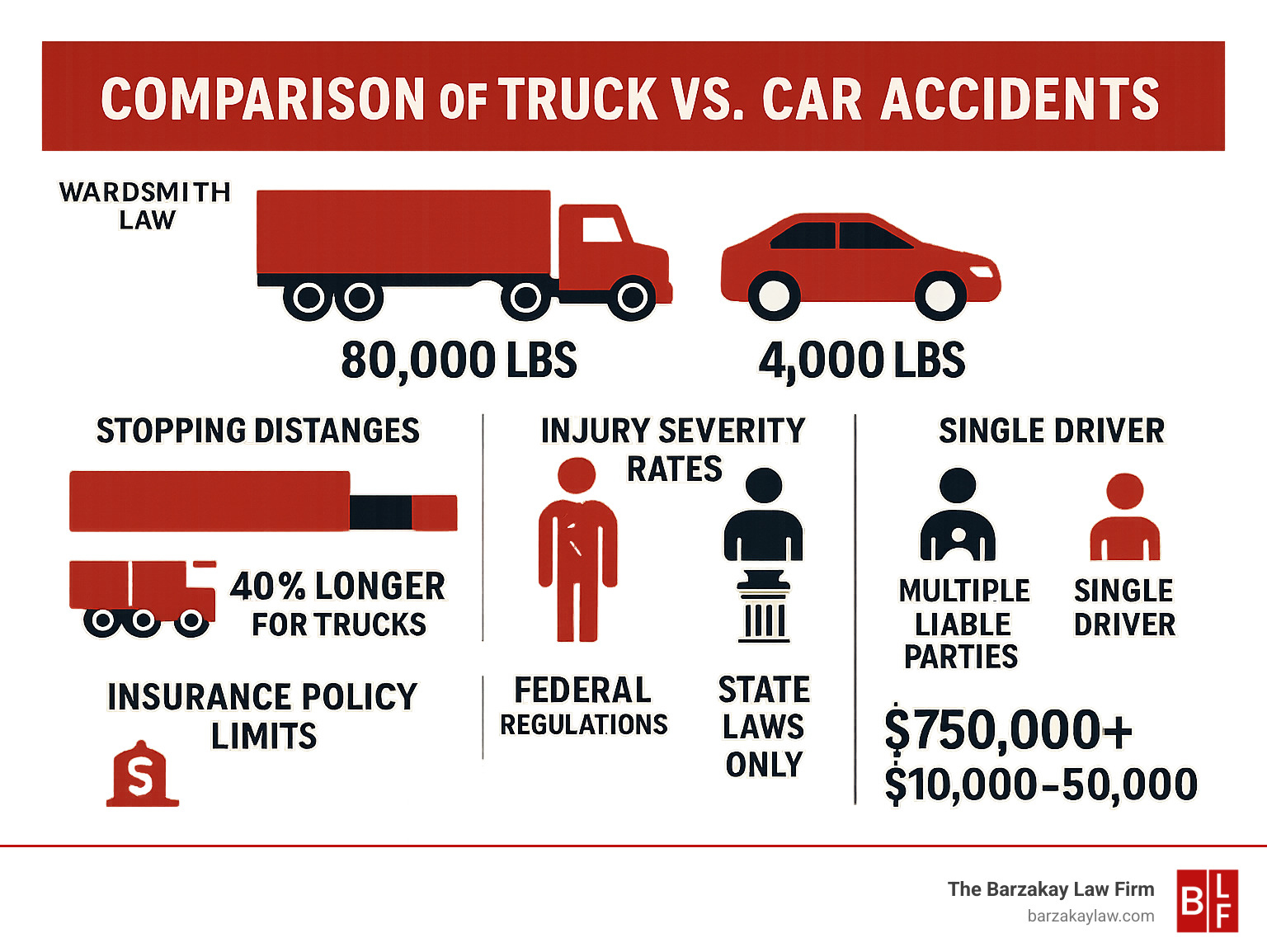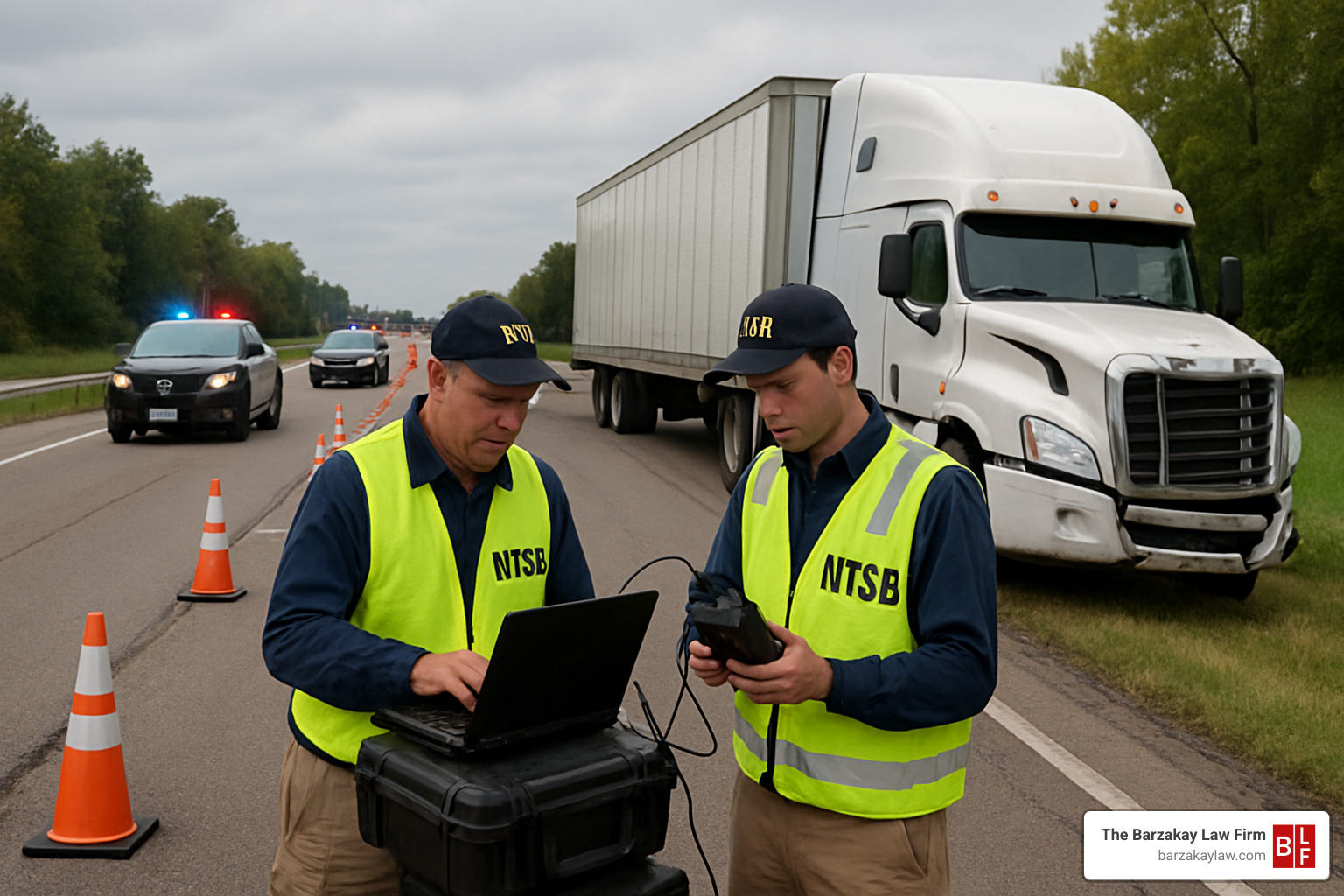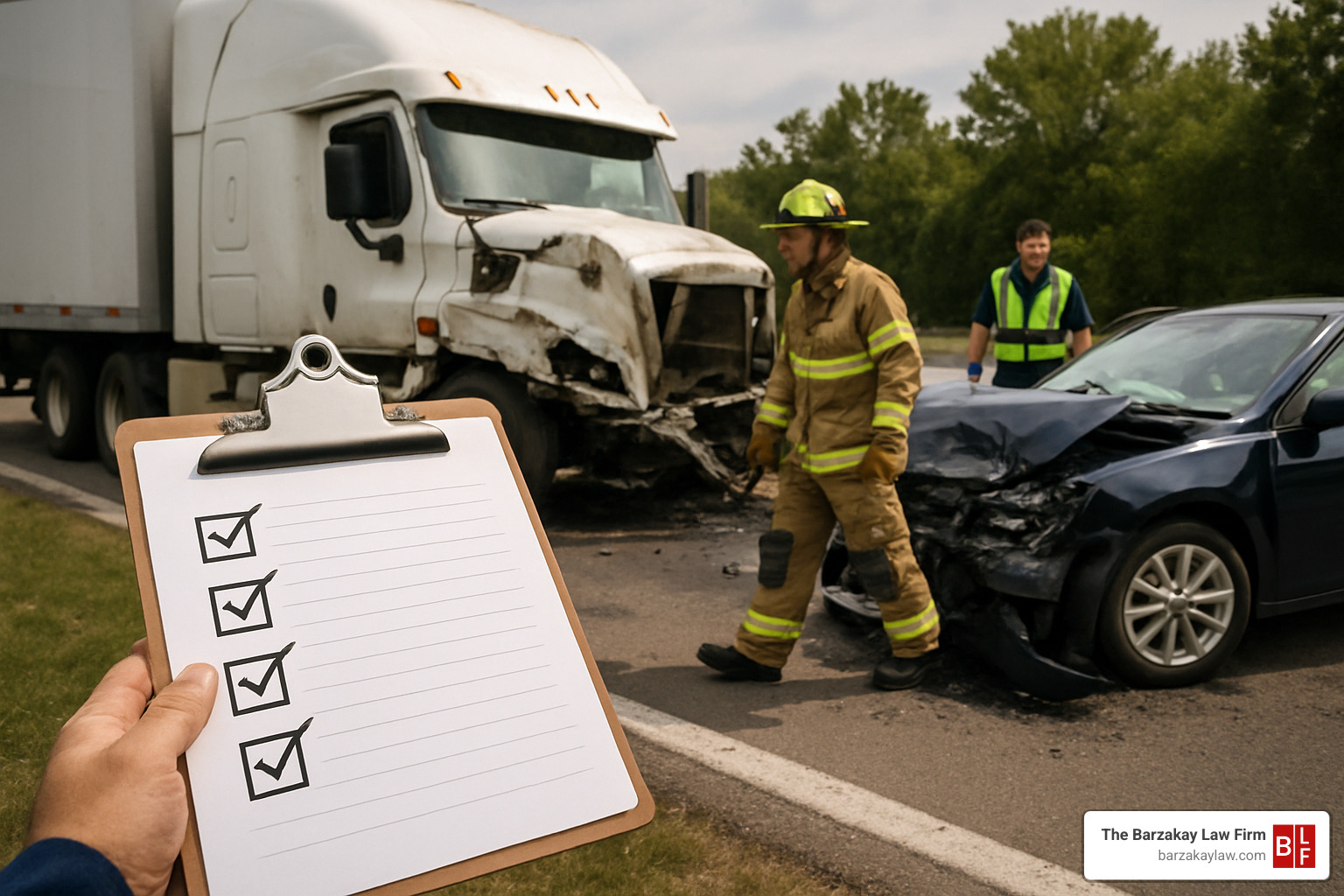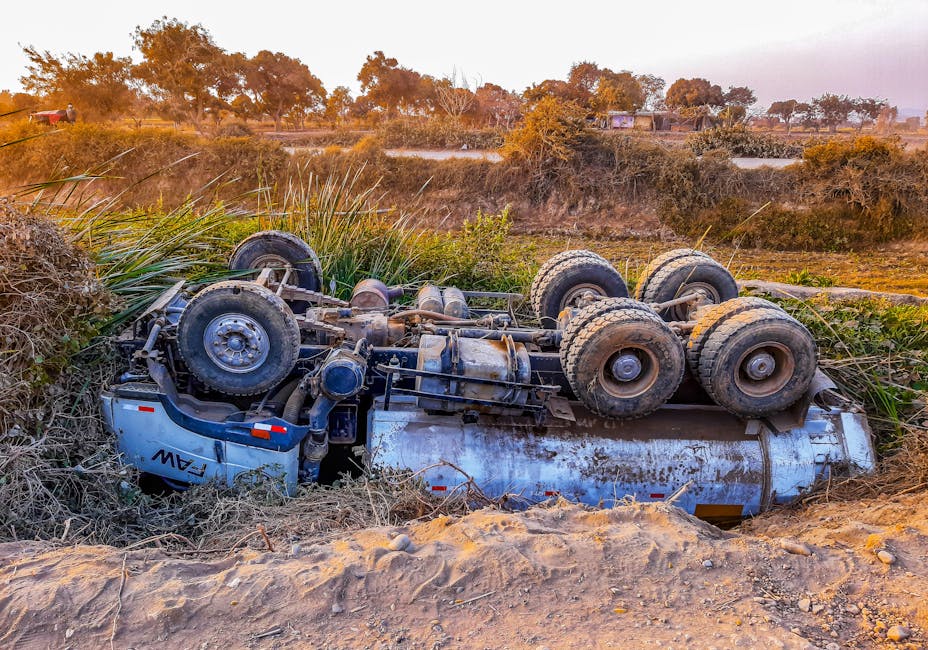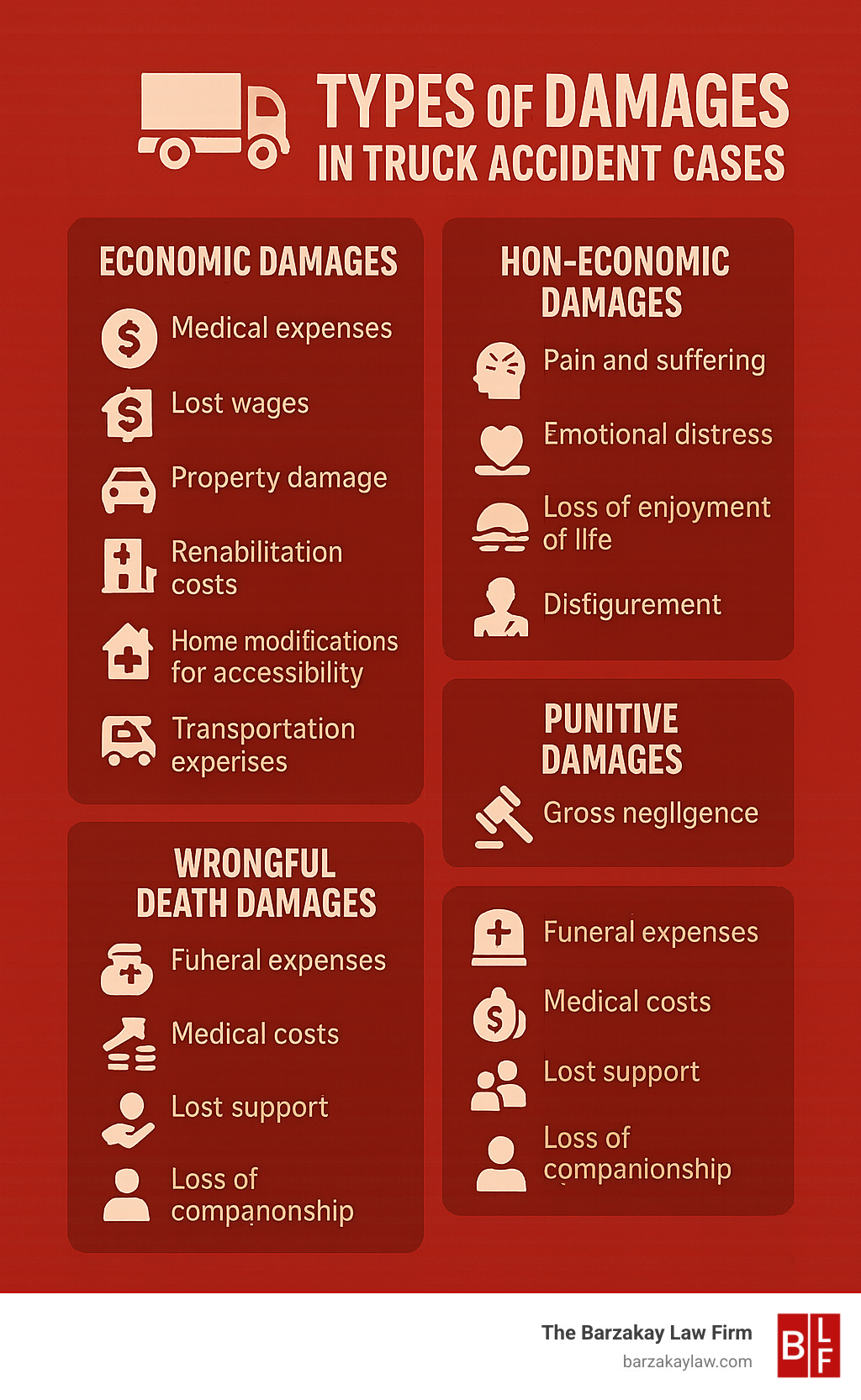When Tragedy Strikes: Understanding Your Legal Options
A truck collision attorney is a lawyer who specializes in representing victims of accidents involving commercial trucks, helping them steer complex legal claims and secure compensation for injuries and damages.
Quick Guide to Truck Collision Attorneys:
* When to hire one: Immediately after any accident involving a commercial truck
* What they do: Investigate accidents, identify liable parties, manage insurance claims, and represent you in court
* Why you need one: Truck accidents involve federal regulations, multiple parties, and higher stakes than typical car accidents
* Cost structure: Most work on contingency (no upfront fees, only paid if you win)
* Time limit in Florida: Two years from accident date to file a claim
Truck accidents are devastating events that can change lives in an instant. When a fully loaded semi-truck weighing up to 80,000 pounds collides with a passenger vehicle, the results are often catastrophic. In Florida alone, there were 2,632 commercial motor vehicle accidents in Orange County in 2021, resulting in 971 injuries and 12 fatalities.
The aftermath of a truck collision brings overwhelming challenges: mounting medical bills, lost income, physical pain, and emotional trauma. For families who have lost loved ones, the grief is compounded by funeral expenses and the sudden loss of financial support.
What many don’t realize is that truck accident claims differ significantly from regular car accident cases. They involve:
- Federal and state transportation regulations
- Multiple potentially liable parties (driver, trucking company, cargo loaders, manufacturers)
- Complex insurance coverage issues
- Corporate defense teams that mobilize immediately after a crash
This is why acting quickly and securing proper legal representation is crucial. The trucking company will have investigators and attorneys on the scene within hours. Without a dedicated truck collision attorney protecting your interests, valuable evidence may disappear.
Remember: In Florida, you generally have only two years to file a truck accident claim, but waiting even a few days can seriously harm your case.
Understanding the Role of a Truck Collision Attorney
When the unthinkable happens and you’re involved in a collision with a commercial truck, having the right legal advocate can make all the difference in your recovery journey. A truck collision attorney isn’t just a lawyer—they’re your guide, defender, and voice when you need it most.
After a truck accident upends your life, your attorney steps in to handle the complex legal maze while you focus on healing. They’ll conduct a thorough investigation of the crash scene, identify everyone who might be responsible (which often extends far beyond just the driver), and secure critical evidence before it disappears.
What truly sets these attorneys apart is their ability to dig deeper. They’ll analyze “black-box” data recorders—the truck’s equivalent of an airplane’s flight recorder—and work with accident reconstruction specialists to establish exactly what happened. They understand the web of federal regulations that govern the trucking industry and know how to spot violations that others might miss.
“Truck accident cases require a completely different approach than regular car accidents,” says a veteran attorney in the field. “The regulations, the physics, the corporate players involved—everything is magnified.”
Key Differences Between Truck and Car Claims
The world of truck accidents operates under different rules than regular car crashes, and understanding these differences is crucial for your case.
For starters, commercial trucks operate under Federal Motor Carrier Safety Administration (FMCSA) regulations—a complex set of rules covering everything from how long drivers can be behind the wheel to how often trucks must be inspected. A truck collision attorney knows these regulations inside and out and can quickly spot when they’ve been violated.
The insurance landscape is also dramatically different. While your average car might carry $10,000-$50,000 in coverage, commercial trucks typically have policies worth $750,000 or more, often with multiple layers of coverage. Navigating these policies takes specialized knowledge and experience.
Perhaps most intimidating is facing corporate defendants rather than individual drivers. After a truck crash, companies immediately deploy teams of investigators and attorneys to protect their interests. Without your own legal advocate, you’re at a serious disadvantage from day one.
The stakes are simply higher too. When an 80,000-pound truck collides with a 4,000-pound car, the results are often catastrophic. The Insurance Institute of Highway Safety reports that in fatal crashes between trucks and cars, 97% of the deaths are occupants of the passenger vehicle. These sobering numbers translate to more complex claims with higher medical costs and greater long-term impacts.
Preserving Rights With a Truck Collision Attorney
One of the most valuable services a truck collision attorney provides happens in the crucial hours and days after an accident—preserving evidence before it vanishes.
Trucking companies know what’s at stake after an accident. Many have rapid response teams that arrive at crash scenes within hours, gathering evidence and building their defense while you’re still receiving medical care. Your attorney levels this playing field by taking immediate action.
They’ll send formal “spoliation letters” that legally require trucking companies to preserve all relevant evidence—driver logs showing hours worked, maintenance records that might reveal neglected repairs, electronic data from the truck’s systems, and footage from dashcams that could prove what happened.
Without these legal demands, critical evidence can disappear quickly. Driver logs might get “updated,” black box data could be overwritten, and witness memories fade with each passing day. Your attorney works to lock down everything that might help your case, from securing the truck’s data records to obtaining surveillance footage from nearby businesses that might have captured the crash.
Behind every effective truck collision attorney is a network of professionals they can call on—accident reconstruction specialists who can determine exactly how the crash occurred, medical professionals who can document your injuries, and economic experts who can calculate your long-term financial losses.
“In these cases, time is truly of the essence,” notes one seasoned attorney. “Evidence that could make or break your case might be gone within days or even hours if not properly preserved.”
Immediate Steps After a Truck Accident
The moments following a truck collision can feel like a blur of confusion and anxiety. What you do during this critical time can dramatically impact your future claim. Let’s walk through the essential steps to take after the dust settles:
First and foremost, your safety matters most. Call 911 immediately to get emergency services on the scene. Even if you feel “just shaken up,” seek medical attention right away. Many serious injuries, like internal bleeding or concussions, might not show symptoms immediately. Following your doctor’s advice creates a documented trail of your injuries that will be invaluable later.
While waiting for help to arrive (if you’re able), start documenting everything. Snap photos of all vehicles involved, focusing on the damage patterns, skid marks, and surrounding road conditions. Make sure to capture the truck’s license plate, DOT number, and company name displayed on the vehicle. These details can disappear quickly once the scene clears.
Exchange information with everyone involved, especially the truck driver. Get their name, contact details, license number, and the trucking company’s information. Don’t forget to collect insurance details from all parties. If there are witnesses, politely ask for their contact information – their perspective could be crucial to your case later on.
When police arrive, ensure they file an official report. This document serves as an independent record of what happened. Get the officer’s name and the report number so you can request a copy later. In Florida, this report becomes an essential piece of evidence.
Within 24 hours, notify your insurance company about the accident. Stick to basic facts and avoid detailed statements or admitting fault. If you’re in Florida, remember to file your Personal Injury Protection (PIP) claim within 10 days – but understand that truck accidents often result in injuries that far exceed PIP coverage limits.
Perhaps most importantly, reach out to a truck collision attorney as soon as possible. While you focus on healing, they can begin protecting your rights immediately. Avoid speaking with the trucking company’s insurance representatives until you have legal counsel – they’re trained to minimize payouts, not maximize your recovery.
Preserve Crucial Evidence With a Truck Collision Attorney
Truck accidents leave behind evidence that can disappear quickly without proper action. A truck collision attorney knows exactly what to preserve and how to secure it before it vanishes.
Electronic Logging Devices (ELDs) track a driver’s hours behind the wheel, potentially revealing violations of federal hours-of-service regulations. These digital records could show a driver who should have been resting was instead on the road when they hit you.
Many commercial trucks now have dashboard cameras that capture everything happening on the road. This footage can be invaluable in establishing what really happened, but trucking companies aren’t required to keep it indefinitely without formal notice.
Your attorney will also obtain cargo manifests and loading records. An improperly loaded trailer can cause catastrophic accidents, and these documents show whether weight was distributed correctly or if the truck was carrying more than legally allowed.
Maintenance records tell an important story too. Commercial trucks require regular inspections as outlined in post-trip inspection regulations. Skipped maintenance or ignored repair needs can establish clear negligence.
The truck’s “black box” data recorder is particularly crucial. Similar to those in aircraft, these devices capture speed, braking patterns, and other vital information from the moments before impact. This data can contradict a driver’s story about what happened.
A good truck collision attorney will immediately send a “spoliation letter” to the trucking company. This formal legal notice demands they preserve all this evidence. Without such notice, companies might claim they routinely disposed of records, leaving you at a significant disadvantage.
Common Mistakes to Avoid
In the emotional aftermath of a truck crash, it’s easy to make mistakes that can hurt your case. Here’s how to protect yourself:
Watch what you say at the scene. Even a simple “I’m sorry” can be twisted into an admission of fault, regardless of your intentions. Let the facts and evidence speak for themselves.
Social media silence is golden. Those innocent photos of you gardening or playing with your kids? Insurance investigators might use them to claim you’re not really injured. Consider taking a social media break until your case resolves.
Quick settlements rarely favor you. Trucking companies know that offering fast money before you understand your injuries can save them thousands. These initial offers typically represent pennies on the dollar compared to what your case might be worth with proper representation.
Delaying medical treatment creates problems. Besides being dangerous for your health, gaps in treatment give defense attorneys ammunition to argue your injuries weren’t serious or came from something else entirely.
Recorded statements can become traps. The friendly insurance adjuster asking for “just a quick statement” is trained to elicit responses that minimize your claim. Politely decline until your truck collision attorney can be present.
Perhaps the costliest mistake is trying to handle everything yourself. Truck accident cases involve complex federal regulations, multiple potential defendants, and corporate legal teams whose sole purpose is minimizing payouts. As one client told us after attempting to negotiate alone: “I had no idea what I was up against until I nearly signed away my rights for a fraction of my medical bills.”
The moments after a truck collision are overwhelming, but taking these steps can make all the difference between struggling with mounting bills and securing the compensation you need to rebuild your life. While you focus on healing, a truck collision attorney can focus on fighting for what you deserve.
Determining Fault and Liability in Florida Truck Crashes
When a massive commercial truck collides with a passenger vehicle, figuring out who’s legally responsible isn’t as straightforward as pointing to the person behind the wheel. Florida truck accidents often involve a web of potentially liable parties, each playing a role in the chain of events that led to your crash.
Let’s break down who might share responsibility for your injuries:
The truck driver might be liable if they were speeding through Palm Beach County, driving while exhausted after ignoring federally mandated rest periods, texting behind the wheel, driving under the influence, making dangerous lane changes, or breaking other traffic laws.
Behind the driver stands the trucking company, which may bear responsibility for putting an unsafe driver on the road through inadequate background checks, providing insufficient training, creating unrealistic delivery schedules that practically force drivers to speed, or failing to properly maintain their fleet.
Don’t overlook the cargo loaders, who can be responsible when improperly secured freight shifts during transport, when trucks hit the road carrying loads beyond their weight limits, or when uneven weight distribution causes a trailer to jackknife.
Vehicle or parts manufacturers enter the liability picture when defective components like faulty brakes, worn tires, or malfunctioning steering systems contribute to a crash, or when safety features fail at the moment they’re most needed.
Maintenance providers who cut corners, skip required inspections, or falsify safety records can also share blame when their negligence leads to mechanical failures on the highway.
Florida’s comparative negligence system means your compensation may be reduced by whatever percentage of fault is assigned to you. It’s worth noting that under Florida’s 2023 modified comparative negligence rule, if you’re found more than 50% responsible, you may be unable to recover damages—making proper legal representation even more crucial.
How Fault Is Proven by Your Truck Collision Attorney
A truck collision attorney doesn’t just point fingers—they build a methodical case based on evidence and legal principles. To establish fault, your attorney needs to prove four essential elements:
First, the defendant had a duty of care—a legal obligation to operate safely on Florida roads. Second, they breached that duty through action or inaction. Third, this breach directly caused the accident. And fourth, you suffered actual harm as a result.
The evidence your attorney will gather to build your case is often more technical and comprehensive than in typical car accident claims. They’ll examine hours-of-service logs to determine if the driver was legally too tired to be on the road, review drug and alcohol testing results, download and analyze “black box” data showing the truck’s speed and braking patterns before impact, inspect maintenance records, review the driver’s history of violations, collect statements from eyewitnesses, secure any available video footage, and may even subpoena cell phone records to prove distracted driving.
Your truck collision attorney will likely bring in professionals like accident reconstruction specialists who can explain exactly how the crash occurred using physics and forensic evidence. Medical professionals will document the full extent of your injuries and future needs. Trucking industry experts can identify specific regulatory violations that contributed to the crash. Economic experts can calculate precisely how much income you’ll lose over your lifetime due to your injuries.
As one attorney puts it, “The black box data from a commercial truck is like having an unbiased witness who remembers exactly how fast the truck was traveling, when brakes were applied, and other critical factors that can make or break a case.”
Special Issues: Punitive Damages and Gross Negligence
Some truck accidents go beyond ordinary negligence into territory that Florida law considers worthy of additional punishment. In these cases, your truck collision attorney may pursue punitive damages—compensation specifically designed to punish particularly bad behavior and discourage others from similar conduct.
To recover these additional damages, your attorney must show the defendant engaged in “gross negligence” or intentional misconduct. This might include a trucking company that knowingly hired a driver with multiple DUI convictions, a dispatcher who encouraged drivers to falsify their rest logs to meet impossible deadlines, a company that repeatedly ignored critical maintenance issues to save money, or a driver who was actively texting or intoxicated when they hit you.
Florida law typically limits punitive damages to $500,000 or three times your compensatory damages (whichever is greater). However, these caps may be lifted in extreme cases where the defendant specifically intended to cause harm.
The burden of proof for punitive damages is higher than for regular compensation, requiring “clear and convincing evidence” rather than just a “preponderance of evidence.” Your truck collision attorney will carefully evaluate your case to determine whether pursuing punitive damages makes strategic sense given the specific circumstances of your crash.
Pursuing Compensation: Damages You May Recover
When a semi-truck collision turns your life upside down, understanding what compensation you deserve becomes crucial to rebuilding your future. A truck collision attorney doesn’t just help you steer legal complexities—they ensure you receive every dollar you’re entitled to for your suffering and losses.
Truck accident victims can pursue several types of compensation, each designed to address different aspects of your experience:
Economic Damages represent the tangible financial losses you’ve suffered. These have clear dollar amounts attached and include your medical bills (both current and those you’ll face in the future), lost wages when you can’t work, and property damage to your vehicle. They also cover rehabilitation costs, any necessary home modifications for accessibility, in-home care expenses, and even transportation to your medical appointments.
Non-Economic Damages acknowledge the very real but harder-to-quantify suffering you’ve endured. Your physical pain, emotional distress, and mental anguish all fall into this category. So does your loss of enjoyment of life—when injuries prevent you from participating in activities you once loved. Permanent scarring, disfigurement, and impacts on your marital relationship (loss of consortium) are also compensable under Florida law.
Punitive Damages come into play when someone’s conduct was particularly outrageous. These aren’t about making you whole—they’re about punishing wrongdoing and deterring similar behavior in the future. In Florida, these damages are typically capped at $500,000 or three times your compensatory damages, whichever is greater.
For families who have lost loved ones, Wrongful Death Damages help address both immediate expenses like funeral costs and longer-term losses like the income and benefits the deceased would have earned. They also recognize the profound emotional impact—the loss of companionship, guidance, and the mental pain surviving family members endure.
While Florida’s personal injury protection (PIP) insurance may cover some initial expenses, truck accidents typically cause damages that far exceed these policy limits. This makes identifying all possible sources of compensation even more important.
Insurance Challenges & Coverage Layers
One of the most daunting aspects of truck accident claims is untangling the web of insurance policies that might apply to your case. Unlike car accidents with typically one policy in play, commercial truck crashes often involve multiple coverage layers:
Commercial trucks generally start with Primary Liability Insurance with limits often between $750,000 and $1 million for trucks crossing state lines. When damages exceed this amount, Excess Coverage Policies kick in, sometimes providing millions in additional protection.
Beyond these, you might tap into Motor Carrier Insurance covering the trucking company itself, Shipper/Broker Insurance from the company that hired the trucking company, and even Cargo Insurance if shifting or falling cargo contributed to your accident.
Insurance companies don’t stay in business by paying out every claim in full. They employ sophisticated strategies to minimize what they pay you, including questioning your injury severity, suggesting pre-existing conditions, shifting blame to you, making lowball early offers, or simply dragging out the process hoping you’ll settle for less out of frustration or financial need.
A truck collision attorney recognizes these tactics immediately and knows how to counter them effectively. They’ll identify every applicable insurance policy and pursue maximum compensation from each responsible party. As one client of The Barzakay Law Firm noted, “They knew exactly which stones to turn over to find all possible sources of compensation.”
Maximizing Recovery With a Truck Collision Attorney
The difference between adequate compensation and truly fair compensation often comes down to how thoroughly your case is prepared and presented. A truck collision attorney employs several powerful strategies to maximize your recovery:
Rather than focusing solely on your current medical bills, your attorney conducts a Comprehensive Damage Assessment working alongside medical and economic professionals. They project the full lifetime cost of your injuries, including future surgeries, long-term rehabilitation, diminished earning capacity, and necessary accommodations.
For catastrophic injuries, your attorney may commission a detailed Life Care Plan—an exhaustive document outlining all your future medical and support needs with associated costs. This powerful evidence helps ensure you’re compensated not just for today’s expenses, but for lifetime needs.
Vocational Experts provide crucial testimony about how your injuries impact your ability to work and earn a living. Their professional assessment strengthens claims for lost future income, particularly for younger victims with decades of working years ahead.
A seasoned truck collision attorney knows the art of Strategic Negotiation—when to engage in settlement talks and when to prepare for trial. Often, demonstrating your readiness for court motivates insurance companies to make fair settlement offers rather than risk a larger jury verdict.
Even while pursuing settlement options, your attorney prepares your case as if it’s definitely going to trial. This Trial Preparation includes gathering compelling evidence and lining up expert testimony that supports your claim for maximum damages.
As one client put it after working with The Barzakay Law Firm, “They left no stone unturned in building my case, and the settlement reflected that thoroughness.” This meticulous approach makes all the difference in securing the compensation you truly deserve after a devastating truck collision.
Choosing and Working With Your Legal Team
Finding the right truck collision attorney feels a lot like finding a trusted partner for an important journey – because that’s exactly what it is. After a devastating truck accident, this person will guide you through complex legal terrain while you focus on healing.
What should you look for in this crucial relationship? Start with someone who has battled in the trenches of truck accident litigation before. These cases aren’t just bigger versions of car accidents – they involve specialized federal regulations, industry practices, and technical details that general personal injury attorneys might miss.
When meeting with potential attorneys, don’t be shy about asking for their track record with similar cases. While past results never guarantee future outcomes (every case is unique), they do reveal valuable experience handling the complexities of commercial truck claims. A truck collision attorney who has successfully steerd these waters before will know the hidden currents and potential obstacles.
Resources matter tremendously in truck accident cases. Your attorney should have the financial capacity to advance costs for accident reconstruction, expert witnesses, and thorough investigations. These cases often become battles of experts – medical professionals, accident reconstructionists, trucking industry authorities – and having the right team makes all the difference.
Pay attention to how the attorney communicates during your initial consultation. Do they explain legal concepts in plain language or hide behind jargon? Do they listen carefully to your story, or seem rushed? You’ll be working closely with this person during a difficult time in your life – feeling comfortable asking questions and confident in their answers is essential.
At The Barzakay Law Firm, we understand that truck accidents turn lives upside down. Our team approaches each case with both compassion for what you’re going through and determination to secure the compensation you deserve. With offices throughout Florida – including Hollywood, Miami, Boca Raton, Sunrise, Orlando, and Fort Lauderdale – we’re accessible to clients across the state when they need us most.
Fee Structures When Hiring a Truck Collision Attorney
“How will I afford a lawyer?” is often one of the first questions accident victims ask themselves. Fortunately, most truck collision attorneys, including our team at The Barzakay Law Firm, work on what’s called a contingency fee basis – a system designed to make quality legal representation available to everyone, regardless of their financial situation.
Here’s how it works: You pay nothing upfront to begin your case. Nothing. Your attorney advances all the expenses needed to build your case – filing fees, expert witness costs, investigation expenses, and more. You only pay if your attorney succeeds in recovering compensation for you, typically taking a percentage of the settlement amount (commonly around one-third).
This arrangement creates a perfect alignment of interests – your attorney is motivated to secure the highest possible compensation because their payment depends on your recovery. If they don’t win your case, you generally don’t owe attorney fees.
Before moving forward, you’ll sign a written fee agreement that clearly outlines the percentage, how costs are handled, and all other terms. This transparency ensures you understand exactly what to expect financially throughout the process.
As one of our clients once put it: “Knowing I wouldn’t owe anything unless they won my case took an enormous weight off my shoulders when I was already dealing with so much.”
Timeline: From Intake to Resolution
Truck accident cases rarely resolve overnight. Understanding the typical timeline helps set realistic expectations about the journey ahead.
Most cases begin with an initial consultation within the first couple weeks after the accident. During this meeting, we’ll review the details of what happened, discuss your injuries, explore your legal options, and – if we’re a good fit – sign a representation agreement.
The investigation phase typically spans the next 1-3 months. This is when your truck collision attorney gathers evidence, obtains police reports and medical records, interviews witnesses, consults with experts, and analyzes truck “black box” data. This foundation-building stage is crucial to establishing liability.
Meanwhile, you’ll continue medical treatment and documentation, which may last anywhere from 3-12 months. Your attorney will track your recovery progress until you reach what’s called “maximum medical improvement” (MMI) – the point where your condition has stabilized enough to assess long-term impacts.
Only then can your attorney prepare a comprehensive demand package that accurately reflects your damages. This demand goes to the insurance companies, launching negotiations that typically last 1-3 months after reaching MMI.
If a fair settlement can’t be reached, your case moves to litigation – filing a lawsuit, engaging in findy (depositions, document exchanges), attempting mediation, and preparing for trial. This phase can take 1-2 years, sometimes longer for particularly complex cases.
Resolution comes either through settlement (which can happen at any point in the process) or a trial verdict. In Florida, the statute of limitations generally gives you just two years from the accident date to file a lawsuit, making prompt legal representation crucial.
Throughout this journey, your truck collision attorney should provide clear updates and realistic timeframes based on your specific circumstances. At The Barzakay Law Firm, we believe in keeping our clients informed every step of the way – because understanding the process helps make it less overwhelming.
Frequently Asked Questions about Truck Collision Cases
How long do I have to file a claim in Florida?
Time is truly of the essence when it comes to truck accident claims in Florida. As of 2023, Florida law gives you just two years from the date of the accident to file your claim. This is actually a significant change from the previous four-year limit, making prompt action even more critical.
If you’re filing a wrongful death claim after losing a loved one in a truck accident, that two-year countdown begins on the date of death rather than the accident date.
While there are some limited exceptions that might extend this deadline – such as cases involving minors, situations where injuries weren’t finded immediately, or instances where the defendant temporarily left the state – it’s dangerous to count on these exceptions applying to your case.
Missing this filing deadline typically means permanently losing your right to seek compensation, no matter how strong your case might have been. As one legal professional puts it: “Why it’s important to act fast after a truck accident: Early involvement preserves evidence: witnesses, forensic data and medical records.”
The bottom line? Contact a truck collision attorney as soon as possible after your accident to protect your rights.
Who can be held liable besides the truck driver?
Truck accidents often involve a complex web of responsible parties beyond just the driver behind the wheel. Understanding all potential sources of liability is crucial to securing full compensation.
The trucking company may bear significant responsibility if they engaged in negligent hiring practices by failing to properly screen drivers, provided inadequate training or supervision, encouraged unsafe practices like exceeding hours-of-service limits, or neglected proper vehicle maintenance.
Cargo loading companies can be held liable if improper loading or securing of freight contributed to the accident. Unbalanced or shifting cargo can cause even the most experienced drivers to lose control.
Vehicle or parts manufacturers might share responsibility if defective components like brakes, tires, or steering systems played a role in causing the crash.
Maintenance providers who performed substandard work on the truck could be liable if mechanical failures resulted from their negligence.
Brokers or shippers who arranged for the transportation sometimes bear responsibility, particularly if they knowingly hired an unqualified carrier or rushed deliveries.
Even government entities might be liable if poor road design or inadequate maintenance contributed to the accident conditions.
A skilled truck collision attorney will thoroughly investigate all these potential sources of liability to ensure you receive maximum compensation for your injuries.
What types of evidence are most persuasive in court?
Building a compelling truck accident case requires powerful evidence, and certain types tend to be particularly persuasive in settlement negotiations and court proceedings.
Electronic Logging Device (ELD) data often provides crucial insights, as these mandatory devices track driving hours and can reveal hours-of-service violations that may have contributed to driver fatigue. Similarly, “black box” data recorders capture vital information about speed, braking patterns, and other vehicle operations in the moments leading up to the crash.
Dashcam footage, when available, offers perhaps the most compelling visual evidence of the accident sequence and driver behavior. This objective record can be difficult for opposing parties to dispute.
Maintenance records can reveal neglected repairs or skipped inspections that point to negligence, while the driver’s qualification file contains important information about training, experience, and safety history.
Eyewitness testimony remains powerful, as accounts from people who observed the accident unfold can provide context that electronic data cannot. This human element often resonates strongly with juries.
Expert testimony from accident reconstructionists, medical professionals, and trucking industry specialists helps interpret complex evidence and establish clear links between the accident and your injuries.
Of course, comprehensive medical records documenting your injuries and treatment create an indisputable record of the accident’s impact on your life.
A truck collision attorney knows how to obtain and present this evidence effectively. As one attorney notes, securing “evidence like witnesses, forensic data and medical records” quickly is crucial, which is why early legal involvement after a truck accident is so important.
Conclusion and Next Steps
Truck accidents can turn your world upside down in an instant. The physical pain, emotional trauma, and financial strain can feel overwhelming – but remember, you don’t have to walk this difficult path alone. A truck collision attorney can become your strongest advocate during this challenging time.
When you’re recovering from a serious accident, the last thing you need is the added stress of fighting insurance companies and trucking corporations. This is why reaching out for legal help promptly makes such a difference. Evidence that could prove crucial to your case – like electronic logs, black box data, and witness memories – begins to fade or disappear almost immediately after a crash.
Your rights deserve protection. Many accident victims unknowingly harm their cases by giving recorded statements too early or accepting initial settlement offers that don’t come close to covering their long-term needs. Having a truck collision attorney by your side means having someone who understands the true value of your claim and won’t let you settle for less than you deserve.
While your legal team handles the complex details of your case, you can focus on what truly matters – healing. Your recovery journey will likely include doctor appointments, physical therapy, and possibly emotional counseling. Document everything along the way – keep records of your treatments, expenses, pain levels, and how your injuries affect your daily life. These details strengthen your case and help paint a complete picture of how the accident has impacted you.
Choosing the right legal representation makes all the difference. Look for a truck collision attorney who has handled numerous commercial truck accident cases and understands the federal regulations that govern the trucking industry. You need someone with both the knowledge to build a strong case and the resources to stand up against powerful trucking companies and their insurance carriers.
At The Barzakay Law Firm, we’ve seen how truck accidents can devastate families. Our team approaches each case with genuine compassion while fiercely advocating for our clients’ rights. With offices throughout Florida – including Hollywood, Miami, Boca Raton, Sunrise, Orlando, and Fort Lauderdale – we’re accessible to accident victims across the state.
We understand that financial worries often prevent people from seeking legal help. That’s why we work on a contingency fee basis – you pay nothing unless and until we win your case. This arrangement allows you to access high-quality legal representation regardless of your current financial situation.
Time is truly of the essence after a truck accident. In Florida, you generally have just two years from the date of your accident to file a claim – and waiting even a few weeks can result in lost evidence and weakened leverage.
Trucking companies mobilize their legal teams immediately after an accident. They have professionals working to minimize their liability from day one. Shouldn’t you have someone equally dedicated fighting for your interests?
Contact us today for a free, no-obligation consultation. We’ll listen to your story, answer your questions, and help you understand your options for moving forward. With The Barzakay Law Firm on your side, you can focus on healing while we focus on securing the compensation you need and deserve.

